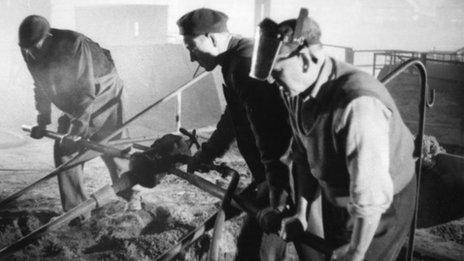Scottish independence: Reacting to recovery
- Published

Scotland has a long history of steelmaking
Scotland, it seems, is sharp on steel. Archaeologists have disclosed that the earliest known use of steel in these islands is to be found in what is now East Lothian.
Our ancestors, it appears, displayed sophisticated skills. Taking the long view, the irony of this steely tale is that modern age Scotland struggled to sustain the contemporary industry, the descendant of that distant endeavour.
Still, onwards and upwards. Literally upwards with regard to the trend in growth. Scotland, we learn, registered a hike of 0.7% in the economy in the third quarter of last year.
The industrial implications will be discussed elsewhere. A word, perhaps, anent the political parameters. You will be astonished to learn that responses differ according to standpoint on independence.
The Scottish Secretary Alistair Carmichael says Scotland is now evidently on the road to recovery "as part of the UK".
Secure base
By contrast, the Finance Secretary John Swinney argues that "the full powers of independence" would enable Scotland to build upon apparent signs of recovery.
There is, of course, more to both arguments. Mr Carmichael adds to the points he made in his speech on Monday to the effect that the UK offers a broader economic spectrum and thus, intrinsically, a more secure base, a "stable platform for sustained growth".
And what of the Scottish government perspective? The economy is largely driven by UK policy decisions - in as much as any economic change is politically controlled, rather than run by global circumstance.
In UK terms, the SNP are an opposition party. They do not like the Tories. Up with them, they will not put. They disagree with them. So it would be understandable if, in a UK context, they talked up the continuing economic challenges confronting these islands.
Which, of course, they do. But that is not the primary emphasis, not the substantive tone, not the impression which emerges. Instead, they talk up the gains, the advance. The reasons are not hard to seek.
SNP pitch
Firstly and understandably, they are seeking to claim credit for any economic advance in Scotland, to argue that efforts by the Scottish government have made a difference.
But there is more at play here. Think of the nature of the SNP offer with regard to independence. It is not a case of frightening the voters, of urging flight from external economic despotism.
Rather, the SNP pitch is to assuage: to say that Scotland is a mature, relatively prosperous, nation right now as part of the UK state - but that things could be so much better under independence.
It is part of the reassurance aspect of the SNP campaign. They seek to argue that they are offering a continuum; economic advance building upon existing strength.
Their calculation is that over-fretful voters, concerned about the economy and jobs, may be less inclined to listen to a proposal for substantial constitutional change. They may tend instead to keep a hold of nurse for fear of finding something worse.
Hence the tone from John Swinney.